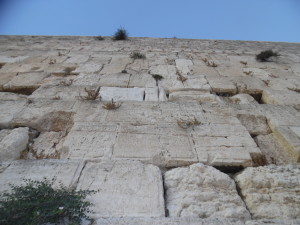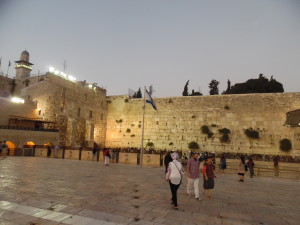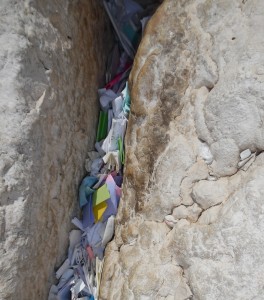 This is not a story about Women of the Wall. That is a story for someone else to tell. So many women have been dedicated to that cause for so many years. I am just a sometimes joiner. A tourist, if you will.
This is not a story about Women of the Wall. That is a story for someone else to tell. So many women have been dedicated to that cause for so many years. I am just a sometimes joiner. A tourist, if you will.
But my daughters really wanted to go. So, despite my dislike of crowds, and of getting up bright and early in order to be spat at and called a Nazi, how could I say no?
When we arrived at the Western Wall gate, the coffee I had chugged at home only 15 minutes earlier had not yet fully kicked in. And so it took a moment to notice that the women’s security line was moving at a snail’s pace while the men — carrying full bags, backpacks, even guns — moved quickly through their lane.
Next to our metal detector, there was a man with a velvet kippah going through each woman’s bag with a fine-toothed comb. He removed books and paged through them, and I couldn’t for the life of me imagine what exactly he was looking for.
Slowly, we inched our way forward, secure in the knowledge that we had nothing even remotely interesting in our bags. Motrin? Pool passes? Lactaid pills?
I went through first, and the guard removed everything from my backpack, with special attention to the bag containing my tallit. It felt vaguely intimidating, and I could imagine his thoughts as he searched in vain for something to prove that I was unwelcome. After a couple of minutes I was waved through, and I waited for my daughter on the other side.
Because her tallit comes with her to school each day, the bag is full. Inside are a couple of prayer books and a bunch of papers, photocopies of various Torah readings and Haftorah readings she has recently learned, wrinkled and with frayed edges. Our intrepid guard opened each prayer book, thumbed through each page. Since it was clear nothing could possibly have been hidden inside, it seemed he was doing all this as a political statement, a form of protest theater.
A woman who wears a tallit has no right to our sacred heritage, his fingers said. She can’t possibly be using a prayer book for its intended purpose. She must be bringing it for some subversive reason.
He pulled the papers from the bag. “You have to leave these here.”
“Why?” My daughter was annoyed, not at all frightened.
“They have Torah readings on them.” The Orthodox rabbi of the Kotel had forbidden women from bringing a Torah scroll to the women’s side. But these sheets would be of no use whatsoever.
“Those aren’t today’s Torah readings!”
“You can collect them when you leave.”
We walked inside, perplexed at his unimaginably stupid logic, but not wanting to have gotten up that early just to miss the main event.
Nearly two hours later, our ears ringing and our heads pounding from the screaming and constant whistles being blown in our ears by Haredi protesters, we went to collect the papers, then cross the plaza to the opposite exit and get quickly to our car, because we needed to get ready for Shabbat.
“Can we have the pages back?” We pointed to the papers sitting on a rack in the corner.
“I have to ask someone.” These were different security guys, none of them overtly religious.
“Are you from Nashot Hakotel (Women of the Wall)?”
“Yeah.” What do you care? (I didn’t actually say that.)
“Why are you blowing those whistles the whole time?”
“Seriously?” (That I did say.) “It’s not us blowing the whistles.”
“Really? Then who’s blowing them?”
“Haredi women. And men.”
“Then what are you doing?”
I felt like I was in The Twilight Zone. What do people generally do at the Kotel? “We were praying.”
“Oh, right, with tefillin.” He gave a bemused look. Like we were praying in chicken suits.
At this point the other guard came back. He told us we would need to exit right there if we wanted the papers. That meant an extra 15-minute walk to the car. We argued. My head pounded even more. And having to explain myself to this man who didn’t have enough brains to look around the corner and see what all the commotion was about each month, or watch the news, or read the paper — he had gotten on my last nerve.
“What could possibly be dangerous about those papers?” I asked, trying mightily to keep my composure.
“I don’t know,” he replied, his voice dripping with sarcasm, “why don’t you tell me what could be dangerous about them. Why they took them from you.”
“I have no idea? They’re idiots?” Oh, yeah. That I said out loud.
So, after the police were called, and yelled at us a bunch, they agreed to show the papers to their “religious expert.” He was a man with a kippah, who looked at the sheets as though they were written in Chinese.
“Here’s what we’ll do,” he offered. He brought over a Haredi guy, no older than 20, wearing a yellow vest. “He’ll hold the papers and bring you to the other exit. You can have them once you’ve left the entire Kotel area.”
And this is how my family and I came to be escorted out of the secure Kotel plaza by a bright yellow-vested Haredi teenager holding the contraband Xeroxes of a teenaged feminist lawless Torah reader.
Rest easy, Jewish people. You are finally safe.
Leah Bieler is a writer and teacher living in Massachusetts. She has an MA in Talmud from JTS. You can follow her on Twitter @LeahBieler
Dear Leah,
You don’t know me but I feel the need to apologize to you. I just finished reading your article about your experience at the Kotel and I am deeply sorry for what you endured. I new about Woman of the wall, and I knew that it was highly controversial and woman were sometimes arrested ( which is beyond insanity) but I did not know that other women visiting the Kotel also abused and harassed women praying. I am sorry. As a Jewish woman who does not wear a Tallit to daven, as a Jewish woman who ascribes to more traditional gender roles in Judiasm, I am so sorry this happened to you and your daughter. While the entire Jewish world may not agree on how to daven, where to daven and what to daven (heck we barely agree on anything, let alone tefilah) we can still respect one another.
I hope your daughter’s (and your) feeling of connectedness to Eretz haKodesh and the Kotel have not been damaged. The Jewish people are inherently connected to the land and to the Beit haMikdash, so despite what imperfect (and sometimes cruel) humans might say, it is hers, it yours and it is everyone’s.
Again, I apologize. The last thing we need during the 9 days is more strife and disunity among ourselves. Wishing you and your family an easy fast. I hope someday very soon to meet you in Eretz Yisrael with the entire Jewish people, together, united with true Ahavat Yisrael and mutual respect for all our differences.”
A Forward Reader


